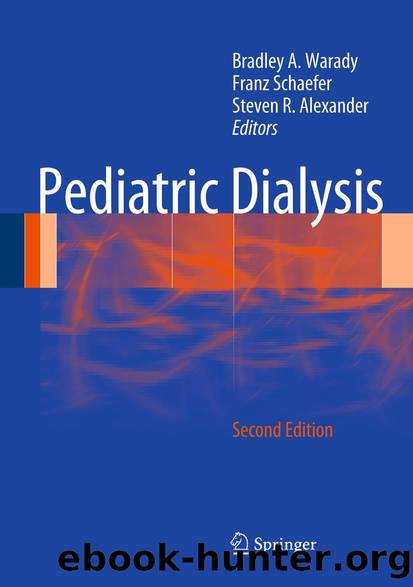Pediatric Dialysis by Bradley A. Warady Franz Schaefer & Steven R. Alexander

Author:Bradley A. Warady, Franz Schaefer & Steven R. Alexander
Language: eng
Format: epub
Publisher: Springer US, Boston, MA
Sodium given as alkali therapy should be considered as part of the daily sodium allowance [119].
Home preparation of sodium chloride supplements using table salt generally is not recommended due to potential errors in formulation that could result in hypo- or hypernatremia [447].
6.2: Sodium supplements should be considered for all infants with CKD stage 5D on PD therapy. (B)
Infants on PD therapy are predisposed to substantial sodium losses, even when anuric. High ultrafiltration requirements per kilogram of body weight result in removal of significant amounts of sodium chloride. These losses cannot be replaced through the low sodium content of breast milk (160 mg/L or 7 mmol/L) or standard commercial infant formulas (160–185 mg/L or 7–8 mmol/L) [449]. Consequences of hyponatremia include cerebral edema and blindness; therefore, neutral sodium balance must be maintained. Therapy should be individualized based on clinical symptoms, including hypotension, hyponatremia, and/or abnormal serum chloride levels. Sodium balance measurements, determined from dietary and medication intake and dialysate effluent losses, should be considered every 6 months concurrent with the measurement of dialysis adequacy. More frequent measurement is indicated after significant changes to the dialysis prescription or clinical status.
6.3: Restriction of sodium intake should be considered for children with CKD stages 2–5 and 5D who have hypertension (systolic and/or diastolic blood pressure ≥95th percentile) or prehypertension (systolic and/or diastolic blood pressure ≥90th percentile and <95th percentile). (B)
When kidney function is impaired, ECF volume increases, edema occurs, and blood pressure increases. Hypertension is already common in the early stages of CKD, with 48–63% of children affected [444, 450]. More than 50% of children on dialysis therapy have uncontrolled hypertension [450, 451], and an additional 20% have controlled hypertension [63, 451–454]. Children with severe hypertension are at increased risk of hypertensive encephalopathy, seizures, cerebrovascular events, and congestive heart failure [455]. Less severe hypertension can contribute to progression of CKD. Therefore, dietary modification is encouraged for children and adolescents who have blood pressures in the prehypertensive range, as well as those with hypertension [455].
A systematic review of pediatric clinical trials demonstrated that modest dietary sodium restriction reduces blood pressure in hypertensive children without CKD [456]. In dialysis patients, many observational and interventional studies of patients with CKD have shown that restricting sodium intake is an essential tool for volume and blood pressure control [457–459]. Aside from preventing acute complications of hypertension, optimal control of blood pressure reduces further kidney damage and modifies progression of disease.
The KDOQI Clinical Guidelines for Hypertension [444], CVD [220], and Dialysis Adequacy [63] are all in agreement that dietary sodium restriction is an important component of a comprehensive strategy for volume and blood pressure control in adults and children with CKD. The earliest recommendation from the Hypertension Guidelines was to limit daily sodium intake to less than 2,400 mg (<104 mmol) [444]. The more recent Cardiovascular and Adequacy Guidelines have lowered the recommendation to less than 2,000 mg (<87 mmol) of sodium per day [450, 459]. The most recent 2005 Dietary Guidelines for Americans older than 2 years [460] recommend
Download
This site does not store any files on its server. We only index and link to content provided by other sites. Please contact the content providers to delete copyright contents if any and email us, we'll remove relevant links or contents immediately.
When Breath Becomes Air by Paul Kalanithi(7252)
Why We Sleep: Unlocking the Power of Sleep and Dreams by Matthew Walker(5636)
Paper Towns by Green John(4163)
The Immortal Life of Henrietta Lacks by Rebecca Skloot(3819)
The Sports Rules Book by Human Kinetics(3581)
Dynamic Alignment Through Imagery by Eric Franklin(3481)
ACSM's Complete Guide to Fitness & Health by ACSM(3459)
Kaplan MCAT Organic Chemistry Review: Created for MCAT 2015 (Kaplan Test Prep) by Kaplan(3418)
Introduction to Kinesiology by Shirl J. Hoffman(3297)
Livewired by David Eagleman(3113)
The River of Consciousness by Oliver Sacks(2988)
Alchemy and Alchemists by C. J. S. Thompson(2907)
The Death of the Heart by Elizabeth Bowen(2895)
Descartes' Error by Antonio Damasio(2727)
Bad Pharma by Ben Goldacre(2722)
The Gene: An Intimate History by Siddhartha Mukherjee(2487)
Kaplan MCAT Behavioral Sciences Review: Created for MCAT 2015 (Kaplan Test Prep) by Kaplan(2483)
The Fate of Rome: Climate, Disease, and the End of an Empire (The Princeton History of the Ancient World) by Kyle Harper(2429)
The Emperor of All Maladies: A Biography of Cancer by Siddhartha Mukherjee(2427)
